
There’s a difference between hard-to-get and impossible-to-get
August 25, 2012
If You Know Your Value, He’ll Get The Message Quickly.
September 10, 2012
When most people hear the words “the big O,” they immediately think of the word orgasm. While clearly that’s a big factor in any “satisfied” relationship, it’s definitely not the only important ingredient.
The “O” I’m Talking about is Objectification
The reason I’m addressing this topic is because it can be a powerful driver of your emotions than can either steer you in the direction of a beautiful and fulfilling relationship…or it can leave you stranded in a ditch wondering what the hell just happened.
What is Objectification & How Does It Harm You?
Objectification is simply a process by which we create some sort of alternate identity or an avatar of sorts for someone that takes away their humanity or human characteristics and reduces them to some kind of simplified caricature. Oftentimes, that new identity is based on some sort of stereotype or an association of some type…but not always. More often than not, objectification is a negative process that tends to limit rather than expand the way we “see” a person.
Here are some examples…
There are many ways this happens in relationships…again, most of them are less than flattering portrayals. Have you ever heard someone refer to a spouse as “the old ball and chain” for example? That’s an objectification that centers around someone who associates them with limited freedom. An old “battle-axe”…that’s hardly flattering. Maybe someone gets tagged as “clueless” if they make a mistake, get lost on a trip or hold an opinion that differs from their mate. Once you begin primarily associating someone with less-than-impressive characteristics, it’s easy to see how you begin to treat them less well…or maybe even downright poorly the longer it continues. I wonder if you can think of a time when you objectified someone or were yourself on the receiving end of it?
Look for it in pop culture
One of the most popular targets of objectification nowadays that plays out every night on prime-time TV is the male head of household figure. If I had a dime for every time a wise-cracking kid or “intellectually superior” wife spoke down to, insulted or ridiculed the husband or father figure on TV, I’d be writing this from a beach somewhere. Ironically, this happens often because it’s “safe” to lampoon the one who’s seen as powerful. Insult a woman or child and you’re seen as a misogynist or bully; go after the man and it’s just plain funny. However, this repetitive man-bashing has a cost when it magically sneaks into our culture due to its familiarity. After all, how do you really feel comfortable deferring to the judgment of the good-natured buffoon who’s been the repeated butt of your jokes that ridicule his very intelligence?
Not all Objectification Is Meant To Be Bad…
Organizations use a positive form of objectification all the time to prop up a leader or lavish praise upon someone. (Although those who hold a different opinion may call it propaganda). For example, a religious institution would exalt their highest leader with glittering titles like “The Holy Pontiff,” “Right Reverend,” “The Grand Ayatollah” or other titles that suggest infallibility and closeness to the Supreme Being they worship. Governments do this very well also by bestowing titles like “President,” “Premier” or even “Lord.” Again, these titles signify rank, privilege and prestige.
Objectification can have deadly consequences, too…
The darkest side of objectification is usually the domain of military organizations. It’s really hard to teach new recruits how to kill an opponent on the battlefield until you objectify “the enemy,” link them with unflattering attributes and take away their humanity. If you want to see a grim portrayal of how that happens, I don’t know of a better example than the Nazi propaganda exhibit at the Holocaust Museum in Washington, DC. For those who haven’t seen it, they show how the Nazis systematically controlled their message about the Jews through spoken word, education, the media and the arts while force-feeding it to a population of people who had fallen on hard times and needed someone to blame.
Pulling it back in…
I apologize if that started to sound like a history lesson or book report. My purpose was to show how wide-ranging and prevalent it is in the human condition to objectify others. I also wanted you to see that whether it was systematic, enforced and purposeful like the Nazi’s…or if it was an accidental, slippery slope that sucks you in over time like prime-time ridicule…the end result is often corrosive and damaging.
So How can We Use This?
First of all, I want you to be aware of the process and how it happens and either STOP IT or “flip the script.” People are human and multi-faceted with numerous gifts, skills and abilities that dwarf any areas that “need improvement” so focus on what’s great and you’ll get more of it. Lastly, the sweetest sound to any soul is the sound of their own name so whenever possible, use it…with a smile on your face and love in your heart.
But If you MUST objectify someone…
It’s perfectly okay and even nice to come up with a “term of endearment” that lights you both up and makes you feel great. Try to focus on the things you LOVE about your partner and you might even want to add the word “my” to it. After all, how are you going to show up when you have a disagreement with the person you call “my baby” or “my angel?” Maybe I’m crazy but I’ve never had a client who was ready to leave a partner they called “my gift from God.” And I seriously doubt that I ever will…can you see how objectification can make or break you? Choose carefully, my friends…
